Housing assistance programs in the Philippines offer various forms of support, including financial aid, subsidies, loans, and access to affordable housing units. These initiatives are implemented through collaboration between the government and various agencies to ensure that eligible individuals and families can access suitable housing options that improve living conditions and promote inclusive communities.
The primary goal of these programs is to alleviate poverty and address the increasing demand for housing, particularly among low-income families, informal settlers, and those affected by natural disasters. By prioritizing vulnerable groups, such as senior citizens and persons with disabilities, these housing initiatives aim to provide every Filipino with a decent place to live, ensuring that shelter is accessible regardless of socio-economic status.
Types of Housing Loans and Assistance Programs in the Philippines
Housing assistance programs in the Philippines can be categorized into several types based on their purpose and target beneficiaries. These categories include:
- General Housing Loans: General housing loans are designed to provide financial support to individuals and families looking to purchase, build, or improve their homes. These loans often feature flexible payment terms, low-interest rates, and various options tailored to meet the needs of different borrowers, such as minimum-wage earners, overseas Filipino workers (OFWs), and low-income families. Programs in this category aim to make homeownership accessible by providing financial assistance that aligns with the borrower’s economic situation.
- Disaster-Related Housing Assistance: Disaster-related housing assistance programs are established to support families and communities affected by natural or man-made disasters. These initiatives focus on providing immediate aid for housing repairs or rebuilding, offering materials or cash to facilitate recovery. Programs in this category ensure that affected families can restore their living conditions quickly and effectively, helping them regain stability in the aftermath of calamities.
- Housing for Specific Demographics: Housing for specific demographics targets distinct groups within the population that require tailored housing solutions. This category includes programs aimed at informal settler families, former rebels, indigenous peoples, and families of military and police personnel. By addressing the unique needs of these groups, these programs provide safe, affordable, and culturally sensitive housing options that promote social inclusion and community integration.
- Community-Based Programs: Community-based programs focus on empowering local communities to collaborate on housing initiatives, improving living conditions through collective efforts. These programs often include financing for land acquisition, community development, and upgrading existing informal settlements. By fostering cooperation among community members and providing resources for shared housing projects, these initiatives help secure land tenure and enhance infrastructure, ultimately leading to stronger, more resilient communities.
These categories reflect the diverse range of programs available to address various housing needs, ensuring that different segments of the population receive the necessary assistance.

Who can Avail
These housing loans and assistance programs are available to:
- Low-Income Individuals and Families: These programs prioritize those struggling financially, considering factors such as income level, household size, and other financial obligations to determine eligibility.
- Veterans: Many housing aid programs include special provisions for veterans, offering tailored housing options, financial assistance, and supportive services to meet their unique needs.
- Individuals Facing Homelessness: Programs aim to assist those at risk of homelessness by providing emergency shelters, transitional housing, rental assistance, and supportive services to help stabilize their situations.
- Regular Members of Pag-IBIG: Filipinos who are regular contributors to the Pag-IBIG Fund can access housing loans with low-interest rates to help build their homes.
These initiatives ensure that a wide range of individuals, particularly those most in need, have access to affordable housing solutions. Here are the actual housing/shelter assistance programs available to provide support and resources to individuals and families in need in the Philippines.
1. Pambansang Pabahay para sa Pilipino (4PH)
Provider: Department of Human Settlements and Urban Development (DHSUD)

The 4PH program is a government initiative managed by DHSUD to provide affordable housing for qualified Pag-IBIG members. It partners with local governments and private sectors to offer accessible residential units. This program primarily targets Filipino workers, aiming to meet the growing housing demand across cities and provinces.
Purpose: To offer affordable housing solutions for Pag-IBIG members through public-private collaborations and government financial support.
Benefits and Other Terms:
- Affordable Pricing: Reduced housing costs due to government subsidies.
- Lower Interest Rates: Discounts on amortization through interest subsidies.
- Amortization Subsidy: Local government support to reduce monthly payments.
- In-City Resettlement: Housing projects located within cities for convenience.
- Loan Amount: Based on affordability and loan-to-value ratios, up to a specified ceiling.
- Loan Term: Up to 30 years, not exceeding the borrower’s 70th birthday.
- Interest Rates: As low as 1.25% for a 3-year fixed period.
- Payment Options: Flexible methods like salary deductions, post-dated checks, auto-debit, and online payments through Pag-IBIG or accredited partners.
2. Emergency Housing Assistance Program (EHAP)
Provider: DHSUD

EHAP provides immediate support to families affected by natural and man-made disasters. It was formerly the Housing Materials Assistance Program (HOMA) and has been streamlined for faster aid distribution. The program offers either cash or housing materials to help rebuild homes.
Purpose: To provide quick and flexible support to families whose houses have been damaged or destroyed by calamities.
Benefits and Other Terms:
- Cash or housing construction materials for repairs
- Faster response to affected families
- Targets both natural and man-made disaster recovery
- Designed to simplify requirements
3. Emergency Shelter Assistance Program (ESAP)
Provider: DHSUD

ESAP aids families affected by disasters, allowing them to rebuild or repair their homes without relocating to resettlement sites. Assistance comes in the form of cash or construction materials. This helps families restore their housing more quickly and independently.
Purpose: To provide resources to families rebuilding homes after disasters without moving to resettlement sites.
Benefits and Other Terms:
- Cash or construction materials provided
- Support for families opting to remain in current locations
- Helps restore housing faster
4. Integrated Disaster Shelter Assistance Program (IDSAP)
Provider: DHSUD

IDSAP is a post-disaster initiative that outlines interventions across three phases: emergency response, early recovery, and rehabilitation. It offers immediate shelter support, financial aid for recovery, and options for longer-term housing solutions. The program aims to address the shelter needs of disaster-affected families at every stage of recovery.
Purpose: To provide comprehensive shelter assistance to disaster-affected communities from immediate response to long-term recovery.
Benefits and Other Terms:
- Emergency Shelter Support: One-time assistance for totally damaged houses
- Financial Assistance for Shelter Recovery: Cash or vouchers to repair or rebuild houses
- Rental Subsidy: Temporary housing support for families unable to rebuild immediately
- Rehabilitation and Recovery: Long-term restoration of housing and living conditions
5. Housing Program for ISFs Living Along Danger Areas in Metro Manila
Provider: National Housing Authority (NHA)

This program is designed to help informal settler families (ISFs) residing in dangerous areas. It provides housing units, along with community facilities and socio-economic programs. It also includes resettlement options in in-city, near-city, or off-city areas.
Purpose: To ensure the safety of ISFs living in hazardous zones.
Benefits and Other Terms:
- Housing provision
- Community facilities
- Socio-economic programs
- In-city, near-city, and off-city resettlement
6. Resettlement Program for ISFs Affected by the Supreme Court’s Mandate to Clean-Up the Manila Bay Area
Provider: NHA

Established in 2018, this program responds to the Supreme Court’s mandate to clean and rehabilitate Manila Bay, including its tributaries. It aims to relocate ISFs residing along the 3-meter easement of rivers and esteros. The program ensures the removal of structures that encroach upon these waterways.
Purpose: To aid in the cleanup and rehabilitation of the Manila Bay area by resettling affected ISFs.
Benefits and Other Terms:
- Compliance with the Supreme Court’s Mandamus
- Resettlement for affected families
- Relocation from rivers and esteros
7. Resettlement Assistance Program to LGUs (RAP-LGU)
Provider: NHA
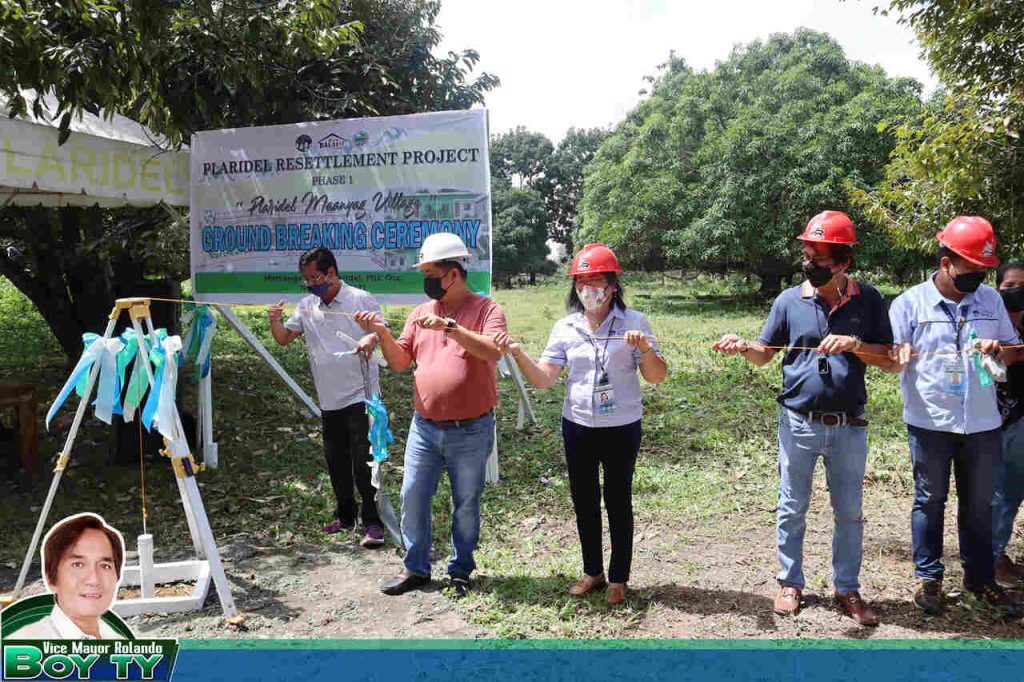
This program supports Local Government Units (LGUs) in implementing urban development and housing programs. It offers both financial and technical assistance to help in the resettlement process. The program aligns with the NHA’s mandate under the Urban Development and Housing Act of 1992 (RA 7279).
Purpose: To assist LGUs in carrying out housing and resettlement initiatives.
Benefits and Other Terms:
- Financial assistance
- Technical support
- Urban development support
8. Resettlement Assistance for Former Rebels
Provider: NHA

Following the issuance of Administrative Order No. 10 in 2018, the program supports the reintegration of former rebels through the Enhanced Comprehensive Local Integration Program (E-CLIP). It provides housing assistance for those who have abandoned armed conflict.
Purpose: To facilitate the reintegration of former rebels into society.
Benefits and Other Terms:
- Housing assistance for former rebels
- Alignment with E-CLIP initiatives
- Centralized government support
9. Comprehensive Social Benefits Program (CSBP) for KIA/WIA and KIPO/WIPO
Provider: NHA

Institutionalized through Executive Order No. 110 (2020), this program offers social benefits and housing assistance to the families of military and police personnel killed or wounded in operations. NHA provides housing assistance under its guidelines through Memorandum Circular No. 2020-049.
Purpose: To support the families of uniformed personnel affected during military or police missions.
Benefits and Other Terms:
- Housing assistance for AFP and PNP personnel
- Support for families of those killed or wounded in action
- Institutionalized social benefits for uniformed personnel families
10. Settlements Upgrading (SU)
Provider: NHA

Settlements Upgrading focuses on improving security of tenure and infrastructure for informal settlers on government-owned land. It includes surveying and titling of individual lots, infrastructure development, and housing construction. Rehabilitation of existing socialized housing sites is also part of the program.
Purpose: To enhance living conditions for informal settlers by providing secure land tenure and improving infrastructure.
Benefits and Other Terms:
- Surveying and titling of lots
- Infrastructure development
- Housing construction
- Rehabilitation of existing sites
11. Socialized Housing Program
Provider: NHA
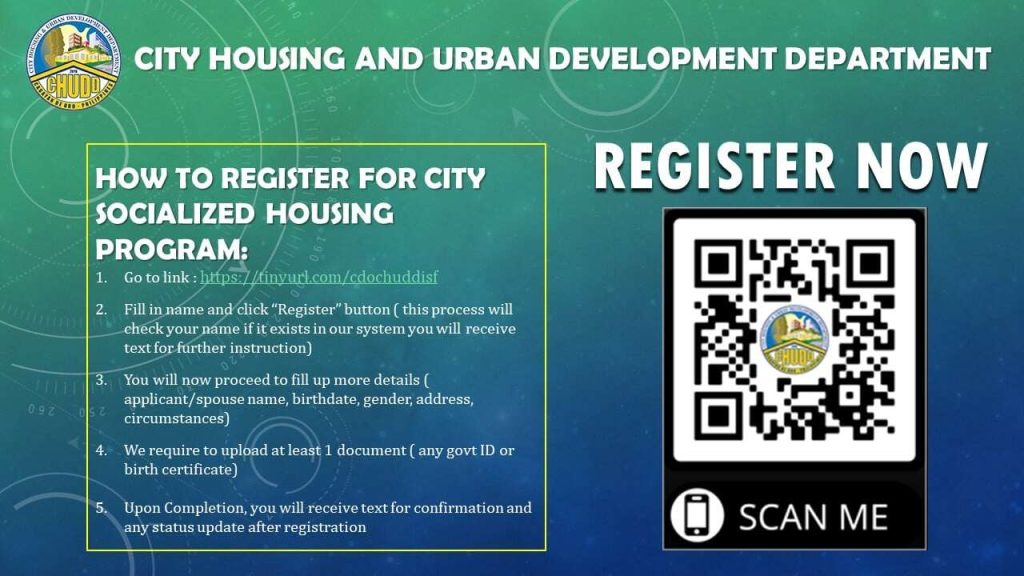
This program provides affordable housing options for low-income families and individuals unable to afford market-priced homes. It offers subsidized housing units with flexible payment terms and financial assistance. The program ensures that homeownership is within reach for qualified beneficiaries.
Purpose: To provide affordable housing options for low-income families.
Benefits and Other Terms:
- Subsidized housing units
- Flexible payment terms
- Financial assistance options
12. Community Mortgage Program (CMP)
Provider: NHA

CMP empowers organized communities by offering community-based financing for land acquisition and housing development. The program requires a minimum of five families working together to acquire and develop land. CMP promotes land ownership and stability through collective efforts.
Purpose: To enable communities to secure land tenure and develop housing collectively.
Benefits and Other Terms:
- Community-based financing
- Assistance with land titles
- Loans for land purchase and development
13. Rental Subsidy Program
Provider: DHSUD

The Rental Subsidy Program provides financial support to low-income families to help cover monthly rental costs. It assists families in accessing safe, affordable housing while easing the financial burden of rent. Eligible families must meet income limitations and other DHSUD requirements.
Purpose: To help low-income families afford rental housing.
Benefits and Other Terms:
- Financial assistance for rent
- Income-based eligibility
- Compliance with DHSUD requirements
14. Disaster Resilient Housing Program
Provider: DHSUD
This program offers housing solutions for families affected by natural disasters, aiming to build resilient, sustainable homes that can withstand calamities. The program includes projects such as the Yolanda Permanent Housing Project and Marawi Rehabilitation Housing Program.
Purpose: To provide secure, disaster-resistant housing for affected families.
Benefits and Other Terms:
- Disaster-resistant housing
- Resilient construction for natural disasters
- Notable projects include Yolanda and Marawi
15. NHA Housing Assistance Program for Indigenous Peoples (HAPIP)
Provider: NHA and National Commission on Indigenous Peoples (NCIP)
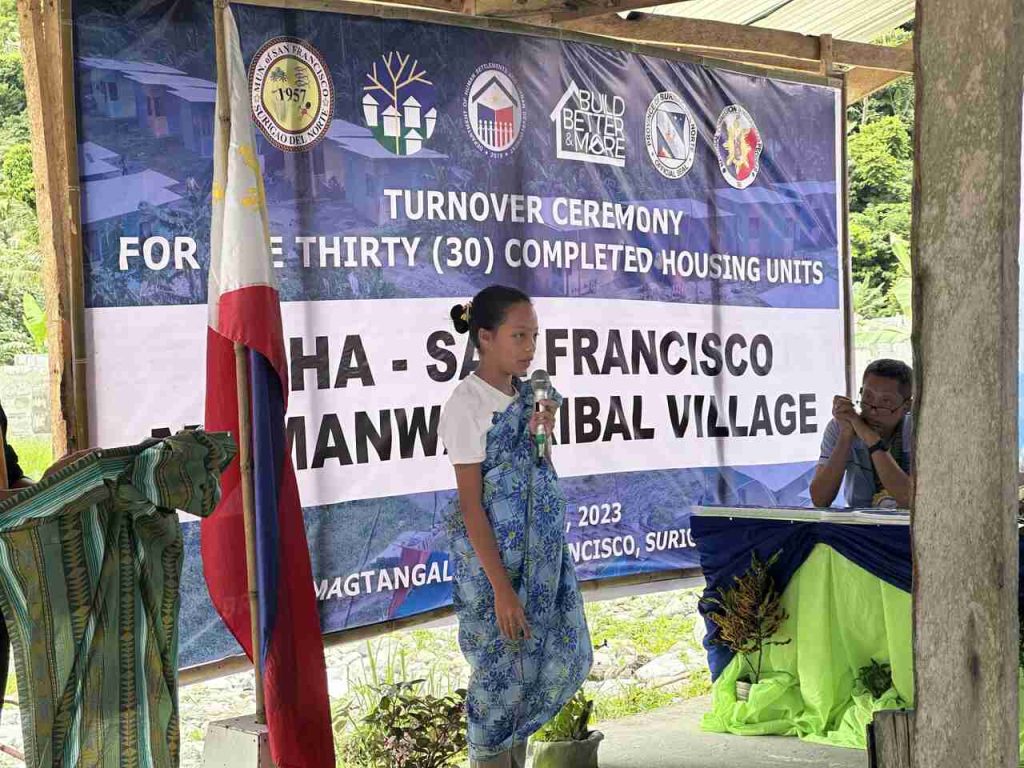
The HAPIP provides housing solutions for indigenous communities in the Philippines, ensuring their cultural practices are respected in the process. It facilitates the development of safe and culturally appropriate housing for these communities, improving their living conditions. The program operates in coordination with local government units (LGUs) and follows Republic Act 8731, known as the Indigenous Peoples Rights Act of 1997.
Purpose: To offer financial and technical assistance in housing for Indigenous Peoples.
Benefits and Other Terms:
- Housing developed within ancestral domains or LGU-owned lands
- Coordinated with NCIP and LGUs
- Supports cultural preservation
16. Housing Assistance Program for Indigenous Peoples (HAPIP-Student Dormitories)
Provider: NHA and NCIP
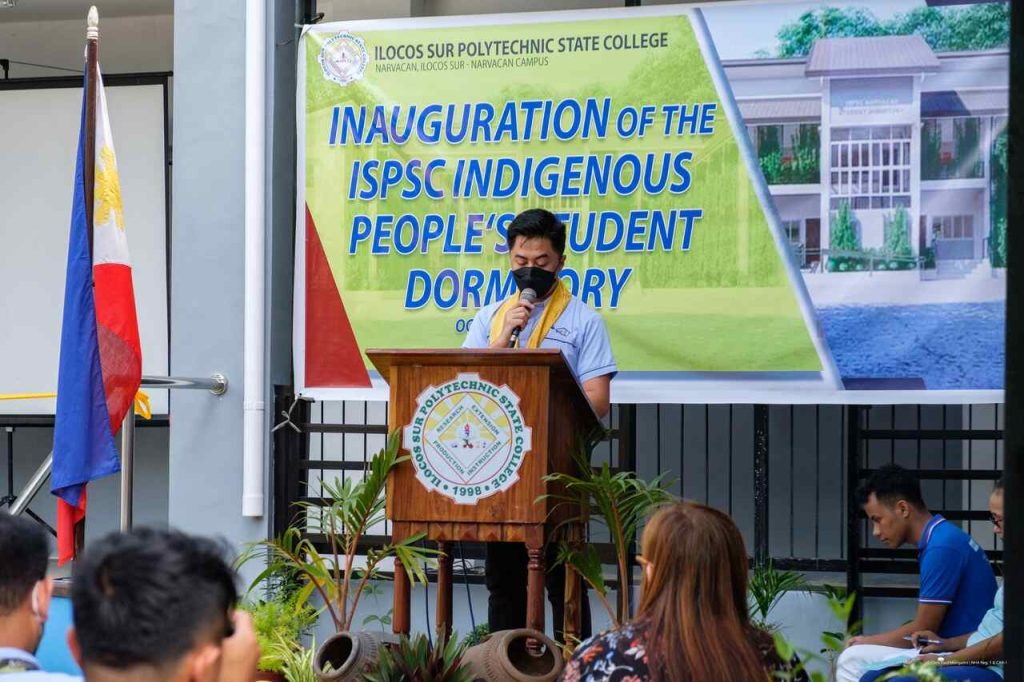
This program provides dormitories for Indigenous Peoples (IP) students enrolled in State Universities and Colleges (SUCs). It aims to give students better access to academic institutions while offering a safe, culturally supportive living environment. Dormitory sites are developed on ancestral domains or lands accepted by the IP communities.
Purpose: To enhance academic opportunities for IP students through safe and accessible housing.
Benefits and Other Terms:
- Dormitories built within ancestral domains or LGU/SUC-owned lands
- Promotes community and educational support for IP students
17. Pag-IBIG Fund Housing Loan Program
Provider: Pag-IBIG Fund
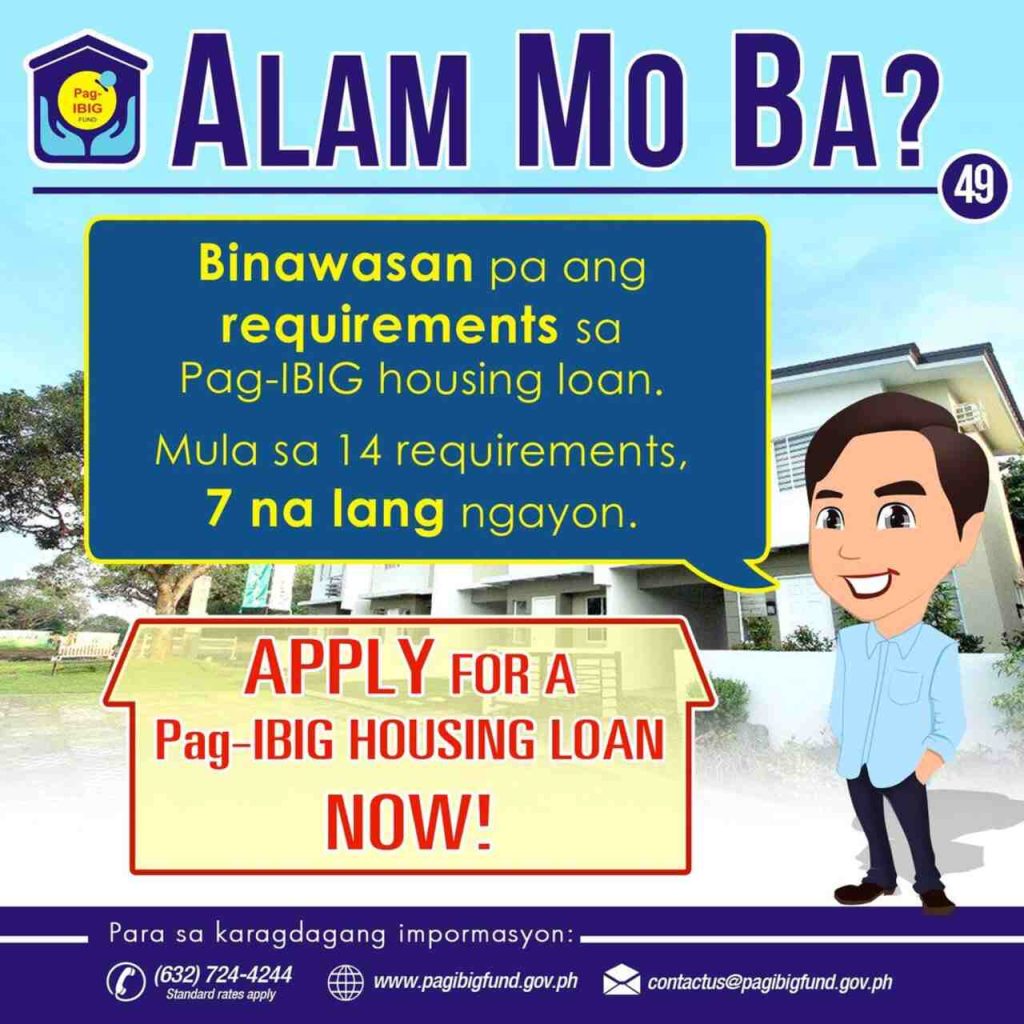
The Pag-IBIG Housing Loan Program offers financing options for Pag-IBIG members who wish to buy, build, or improve a residential property. It provides flexible payment terms and low-interest rates, addressing housing needs such as lot purchases, home construction, renovation, or refinancing existing loans.
Purpose: To assist Pag-IBIG Fund members in acquiring or improving residential properties.
Benefits and Other Terms:
- Maximum loan amount: Up to P6 million
- Interest rates: Starting at 5.750% for a 1-year fixing period
- Maximum payment period: 30 years
- Insurance coverage: Mortgage Redemption Insurance (MRI), Fire and Allied Perils Insurance (FAPI)
18. Pag-IBIG Home Equity Appreciation Loan (HEAL)
Provider: Pag-IBIG Fund

HEAL offers low-interest loans for members with existing housing loans, allowing them to borrow against their property’s net value. These funds can be used for personal needs such as home renovations or purchases. This option provides financial flexibility for members with mortgages.
Purpose: To provide extra funding for personal and household needs.
Benefits and Other Terms:
- Loan Amount: Based on net value of mortgaged property
- Interest Rates: Varies based on repricing period
- Repayment Term: Maximum of 30 years, not exceeding age 70
- Insurance: Includes Mortgage Redemption Insurance (MRI), Sales Redemption Insurance (SRI), and Non-Life Insurance (NLI)
- Payment Options: Available through Virtual Pag-IBIG or accredited partners
19. Pag-IBIG Fund Affordable Housing Loan for Minimum-Wage Earners
Provider: Pag-IBIG Fund
This program offers subsidized housing loans to minimum-wage and low-income members, helping them purchase affordable homes. It targets members earning up to P15,000 in NCR or P12,000 outside NCR. The program ensures affordable home ownership for the low-income sector.
Purpose: To offer affordable housing finance for minimum-wage and low-income earners.
Benefits and Other Terms:
- Loan Amount: Up to P750,000
- Interest Rates: 3% per annum (for loans up to P580,000), 6.5% per annum (for loans up to P750,000)
- Repayment Term: Up to 30 years
- Collateral: Secured by the purchased property
- Insurance: Includes MRI, SRI, Fire and Allied Perils Insurance
20. Home Savers Program
Provider: Pag-IBIG Fund

This initiative helps members struggling with housing loan payments by offering flexible solutions to prevent foreclosure. The program includes restructuring loans, creating installment plans for overdue amounts, revaluing properties, and waiving penalties. It ensures continued home ownership despite financial difficulties.
Purpose: To help members manage housing loans and avoid foreclosure.
Benefits and Other Terms:
- Housing Loan Restructuring: Extends or modifies loan terms to reduce monthly payments
- Plan of Payment: Installment plan for members with at least three months of arrears
- Housing Loan Revaluation: Revaluation of property with discounts for various settlement modes
- Penalty Condonation: Waives penalties and additional interest for updating overdue accounts
21. SSS Direct Housing Loan Facility for OFWs
Provider: Social Security System (SSS)
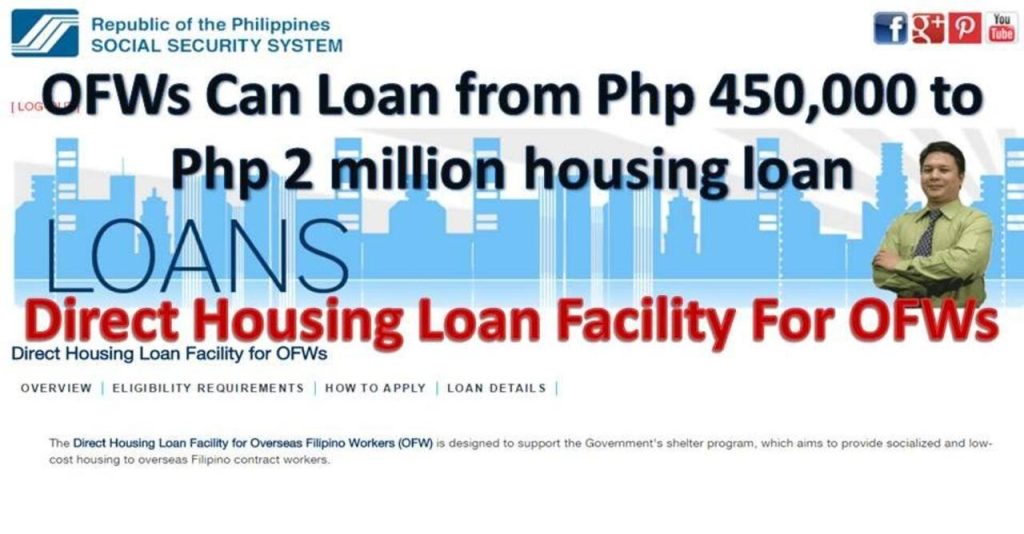
This program provides OFWs with financial assistance to purchase or construct residential properties, including houses, lots, or condominium units. It covers socialized and low-cost housing with loan terms that align with the borrower’s financial capacity and collateral value. Interest rates are tiered based on the loan amount, and various housing options are available to meet diverse needs.
Purpose: To support OFWs in acquiring or improving homes in the Philippines while they work abroad.
Benefits and Other Terms:
- Loanable Amount: Up to PHP 2,000,000
- Socialized Housing Loan: Up to PHP 450,000
- Low-cost Housing Loan: Ranges from PHP 450,000 to PHP 2,000,000
- Loan Term: Up to 15 years
- Interest Rates: 8% to 11%, depending on loan amount
- Collateral: Real Estate Mortgage (REM) secured by the property
- Insurance: Mortgage Redemption Insurance, Fire Insurance, and Home Guaranty Corporation (HGC) coverage
- Payment: Various overseas payment centers (PNB, i-Remit, Metrobank, etc.)
22. SSS Housing Loan for Repairs and/or Improvements
Provider: SSS

This program provides financial assistance to SSS members for the repair or improvement of their homes. The loan is available for a variety of home enhancement projects and is payable over extended terms with a fixed interest rate. The loan helps members improve the value and livability of their properties.
Purpose: To aid SSS members in financing repairs or improvements to their residential properties for better living conditions and increased property value.
Benefits and Other Terms:
- Loanable Amount: Up to PHP 1,000,000
- Interest Rate: 9% per annum
- Loan Term: Up to 20 years (15 years for OFWs)
- Collateral: Property secured by a first mortgage
- Insurance: Mortgage Redemption Insurance and Fire Insurance
- Loan Fees: Processing fee (0.5% of loan amount) and inspection fee (PHP 500)
23. NHA Government Employees Housing Program (GEHP)
Provider: NHA

The Government Employees Housing Program (GEHP) was created under Section 2 of AO No. 9 s. 2011, assigning the NHA to manage and lead the implementation of housing programs for government employees and uniformed personnel. The program enhances the previous AFP/PNP housing models, expanding it to all government employees, including members of the military, police, and other uniformed services. The initiative offers a variety of housing models, including duplexes and high-rise condominiums, designed to provide decent and affordable homes.
Purpose: To provide affordable and comfortable housing for government employees and uniformed personnel in growing urban centers across the country.
Benefits and Other Terms:
- Offers various housing models: One-story duplex, Two-story duplex, Low-Rise Buildings (LRB), Medium-Rise Buildings (MRB), and High-Rise Buildings (HRB)
- Housing units feature two bedrooms, toilet and bath, kitchen, living area, and parking space
- Horizontal housing includes up to 150 sq.m. lot area with 60 sq.m. floor space; condo units range from 36-42 sq.m.
- Available for government employees including AFP, PNP, BJMP, BFP, BuCor, and other agencies
- Financing available through Pag-IBIG Housing Loan
- 16 ongoing projects with 16,545 units in development, plus nine upcoming projects
- First completed project: Scout Ranger Ville in San Miguel, Bulacan, with 1,000 units for the First Scout Ranger Regiment of AFP
Video: Housing Loan Programs for OFWs
If you are an Overseas Filipino Worker (OFW) and you are looking to build or buy your dream home but can’t afford to pay for it in cash, then you might be interested in this video from RICROD-PH:
Summary
Housing assistance and loan programs in the Philippines are essential initiatives designed to provide financial support and improve living conditions for a diverse range of individuals, particularly low-income families, veterans, and those affected by disasters. These programs, managed by various government agencies, ensure access to affordable housing solutions that foster community inclusion and promote the overall welfare of vulnerable groups. If you or someone you know is interested, then, you can take a closer look at the programs listed above to find the one that best suit your needs.
